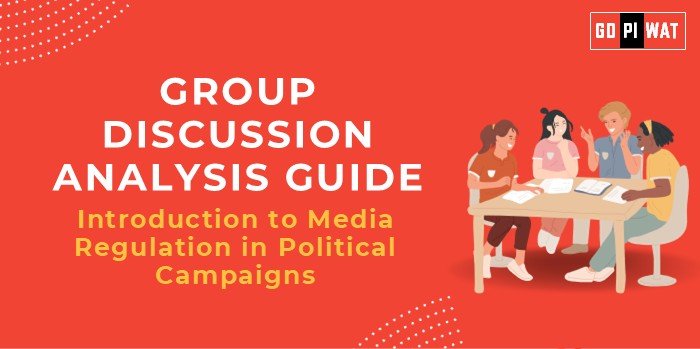📋 Group Discussion (GD) Analysis Guide: Should Governments Regulate the Role of Media in Political Campaigns?
🌐 Introduction to Media Regulation in Political Campaigns
- 📖 Opening Context: Media plays a pivotal role in shaping public opinion during political campaigns, often influencing election outcomes. However, questions about misinformation, bias, and ethical standards have sparked debates about regulatory oversight.
- 💡 Topic Background: With the rise of social media and 24/7 news cycles, media’s power has exponentially grown. While it amplifies democratic participation, unchecked media can manipulate narratives and erode trust in democratic systems.
📊 Quick Facts and Key Statistics
- 🌍 Global Misinformation: Over 70% of internet users globally encounter fake news during elections (Statista, 2023).
- 📺 Political Advertising: $14 billion spent on media ads in the 2020 U.S. elections, the highest in history (OpenSecrets, 2021).
- 📱 Social Media Influence: 62% of U.S. adults get their news from social media (Pew Research Center, 2023).
- ⚖️ Regulatory Gaps: Only 45% of countries have regulations governing political ads on social platforms (UN Report, 2023).
👥 Stakeholders and Their Roles
- 🏛️ Governments: Ensure transparency and fairness in political advertising and prevent manipulation.
- 📡 Media Platforms: Facilitate balanced coverage and restrict misinformation.
- 🏢 Political Parties: Use media responsibly to promote campaigns without spreading disinformation.
- 🙋 Citizens: Critically analyze media content and demand ethical practices.
- ⚖️ Regulatory Bodies: Monitor compliance and implement penalties for violations.
🏆 Achievements and Challenges
✨ Achievements:
- 📈 Enhanced Voter Engagement: Media brings campaign messages to a broader audience, encouraging participation.
- 📝 Awareness Campaigns: Fact-checking initiatives reduce misinformation (e.g., Media Literacy Programs in Finland).
- 🌐 Innovative Campaigning: Social media democratizes campaigning for smaller political entities.
⚠️ Challenges:
- 📣 Bias and Polarization: Many media outlets show political bias, polarizing voters.
- ❌ Misinformation Epidemic: Deepfakes and fake news manipulate public opinion.
- 💰 Campaign Finance Issues: Unregulated spending on ads creates an uneven playing field.
- 🌍 Global Comparison: Countries like Germany have stricter regulations, limiting political ad spend, unlike the U.S.
📄 Structured Arguments for Discussion
- 👍 Supporting Stance: “Government regulation ensures transparency, minimizes misinformation, and promotes fair elections.”
- 👎 Opposing Stance: “Excessive regulation risks media censorship, curbing freedom of speech and press.”
- ⚖️ Balanced Perspective: “A balance between regulation and freedom of the press is essential to safeguard democracy.”
💬 Effective Discussion Approaches
- 🎯 Opening Approaches:
- 📊 Statistical Insight: “With $14 billion spent on political ads in 2020, media regulation is critical to ensure fairness.”
- 📚 Case-Based Opening: “The Cambridge Analytica scandal highlights how unregulated media data can manipulate elections.”
- 🤝 Counter-Argument Handling: Propose solutions like independent oversight bodies or transparency requirements.
🔎 Strategic Analysis of Strengths and Weaknesses
- 💪 Strengths: Informed electorate, reduced misinformation, global precedents for success.
- ❌ Weaknesses: Risk of censorship, regulatory capture, implementation challenges.
- 🌟 Opportunities: Leverage AI for fact-checking, enhance transparency in campaign finance.
- ⚠️ Threats: Increased cyber threats, resistance from media giants, stifling small campaigners.
🎓 Connecting with B-School Applications
- 🌍 Real-World Applications: Draw parallels between media ethics in campaigns and corporate ethics in marketing.
- 📝 Sample Questions:
- 💡 “How can governments ensure fair media representation in elections?”
- 🔍 “Should corporate models of regulation inspire political media oversight?”
- ✨ Insights for B-School Students: Explore how regulation impacts public trust, brand equity (political branding), and stakeholder management.


